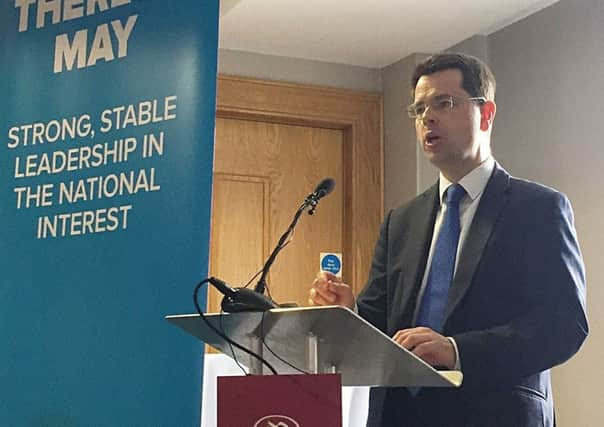Brokenshire: DUP and Sinn Fein have 29 days or they pass the baton


Speaking to the News Letter yesterday as he launched the Northern Ireland Conservatives’ manifesto, James Brokenshire delivered a coded but blunt message to the dominant parties within unionism and nationalism.
Mr Brokenshire – who was launching a manifesto which explicitly rules out the nationalist hope for joint London-Dublin rule of Northern Ireland – repeatedly stressed that he believed a deal to restore devolution was “completely achievable” before the end of June.
Advertisement
Hide AdAdvertisement
Hide AdHe said that there is a “21-day window” after next Thursday’s election in which to restore devolution, but stressed that the Government had been “equally clear on our responsibilities to the people of Northern Ireland” to deliver governance.
The Civil Service has now been operating without any democratic political control for almost three months. From July, critical budgetary decisions mean that Westminster would have to step in to at least pass a budget or else some public sector workers would begin to be laid off.
Yesterday Mr Brokenshire steadfastly refused to use the words ‘direct rule’ to describe what will happen if devolution cannot be restored.
However, he made clear that Westminster will be the only democratic vehicle whereby decisions about Northern Ireland could be taken in such a scenario.
Advertisement
Hide AdAdvertisement
Hide AdThe Conservative manifesto stresses the party’s desire to restore power-sharing but adds pointedly that “a Conservative government will do all that is necessary to provide the good governance and political stability that Northern Ireland needs, including political decision-making from Westminster if that is what is required”.
When it was put to Mr Brokenshire that, based on what his party was saying, direct rule appeared to be the only logical alternative to Stormont, Mr Brokenshire said that the Government’s focus was on “seeing that we get an Executive back into place”, something which he said was “profoundly in Northern Ireland’s best interests”.
“We don’t want to move to a situation of direct rule, but as the manifesto underlines, we will take all necessary and appropriate action which might mean – if we don’t have an Executive in place – taking more decisions not from Northern Ireland but from Westminster.”
He said “that does not need to happen” and added: “I strongly believe that we can see devolved government restored here” and went on: “We can’t have a continuing, extended period without political leadership here in Northern Ireland,” adding: “Obviously if we were to go through the 29th of June, that would effectively pass the baton from the parties in Northern Ireland to a new government to make those decisions. “I don’t want to pre-judge the situation; I don’t want to pre-judge what the position is. But I think it is that sense of focus that we have and actually seeing that we bring about that change before the 29th of June because once you pass that again it passes the baton across to the UK government rather than people here, politicians here, making that decision and forming that Executive.”
Advertisement
Hide AdAdvertisement
Hide AdSpeaking about the need to address problems in areas such as health and education which currently are not being tackled due to the absence of any government ministers, Mr Brokenshire said: “The point is that the legislation provides that window and once we pass the 29th of June, well, that actually means that it’s not the politicians here that would have that chance, that would have that choice, it would be for an incoming government to have the decision-making around that and the tough decisions that might mean, the fact there remains the potential for an election, there remains the potential for other decisions in terms of greater decision-making from Westminster.
When asked if June 29 would be the ultimate deadline or would again be pushed back – as happened in March – Mr Brokenshire said “that will be for an incoming government to make those decisions”.
Mr Brokenshire also set out why voters should not vote for the DUP. The Conservatives have had an increasingly close relationship with the DUP at Westminster and share several key policies. When asked why voters should not vote for the DUP as the party most likely to win seats in Northern Ireland, he said that the Conservatives were a UK-wide party which was able to win an election outright and form a government.
Mr Brokenshire went on: “Yes of course there may be certain elements of commonality between ourselves as a party of the Union, as a party that wants to get on and deliver the best possible outcome for Brexit, but I think this manifesto that we’ve published today outlines a distinctive Conservative agenda of our values, of our beliefs, of some of those liberal social values that we have taken forward as a party over many, many years. And also on things like the economy, like taxation, like social welfare reform – there is a very distinctive agenda that we are setting out today.”